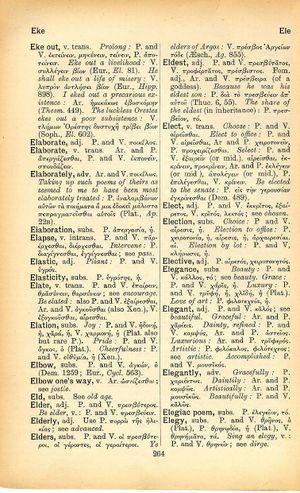eldest: Difference between revisions
From LSJ
Τὰ μικρὰ κέρδη ζημίας μεγάλας (μείζονας βλάβας) φέρει → Minora noxas lucra maiores ferunt → Die kleinen Ränke tragen große Strafe ein
(CSV4) |
m (Woodhouse1 replacement) |
||
| Line 1: | Line 1: | ||
{{Woodhouse1 | {{Woodhouse1 | ||
|Text=[[File:woodhouse_264.jpg|thumb|link={{filepath:woodhouse_264.jpg}}]] | |Text=[[File:woodhouse_264.jpg|thumb|link={{filepath:woodhouse_264.jpg}}]] | ||
P. and V. πρεσβύτατος, V. προφέρτατος, [[πρέσβιστος]]. | ===adjective=== | ||
Fem. adj., Ar. and V. [[πρέσβειρα]] ( | |||
[[prose|P.]] and [[verse|V.]] [[πρεσβύτατος]], [[verse|V.]] [[προφέρτατος]], [[πρέσβιστος]]. | |||
Fem. adj., [[Aristophanes|Ar.]] and [[verse|V.]] [[πρέσβειρα]] (of a [[goddess]]). | |||
[[because he was his eldest son]]: [[prose|P.]] [[διὰ τὸ πρεσβεύειν ἀπ' αὐτοῦ]] ([[Thucydides|Thuc.]] 6, 55). | |||
[[the share of the eldest]] ([[in inheritance]]): [[prose|P.]] [[πρεσβεῖον]], τό. | |||
}} | }} | ||
Revision as of 08:54, 20 May 2020
English > Greek (Woodhouse)
adjective
P. and V. πρεσβύτατος, V. προφέρτατος, πρέσβιστος.
Fem. adj., Ar. and V. πρέσβειρα (of a goddess).
because he was his eldest son: P. διὰ τὸ πρεσβεύειν ἀπ' αὐτοῦ (Thuc. 6, 55).

